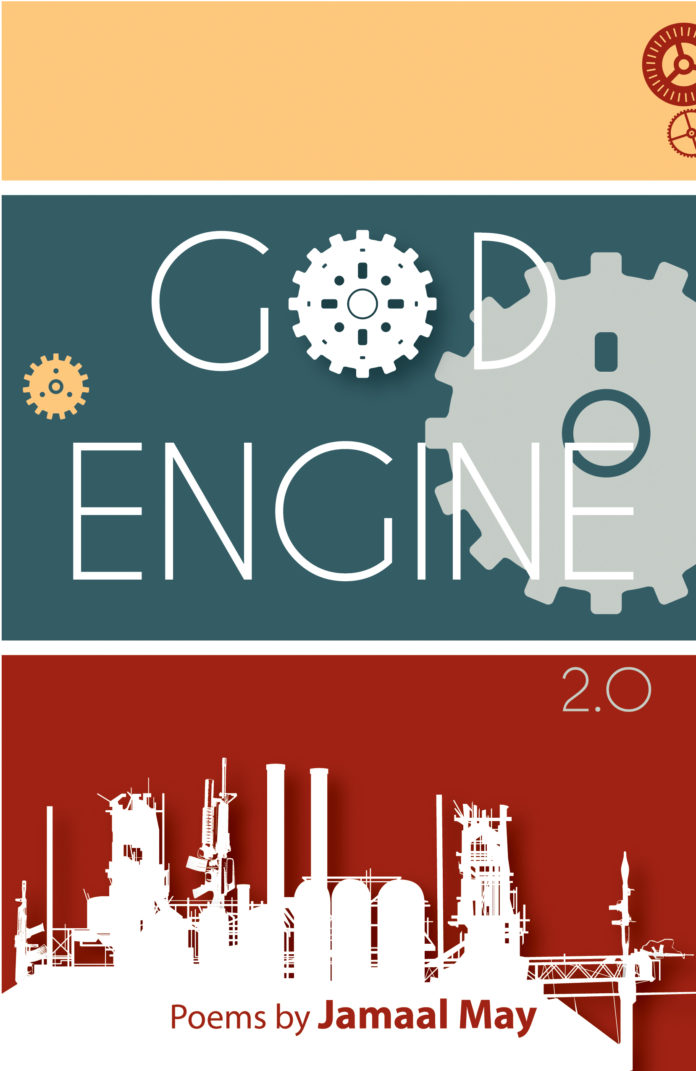Welcome to Lit Review, where columnist Dominiq Wilson will take apart a series of chapbooks to figure out what works and what doesn’t for the modern reader of poetry.
Jamaal May, the founder of Detriot-based chapbook distributor Organic Weapon Arts, released the second edition of his first chapbook, “God Engine 2.0,” in 2012. It’s described as a collection that combines war and conflict as well as the whimsical world of childhood. While the two seem to lie on two distinct sides, I was pleasantly surprised to read how well these two ideas connect.
I recall my review of “The Spoons in the Grass are There To Dig a Moat” as having a consistent pattern of switching between an innocent and realistic perspective of the world. In “God Engine 2.0,” the switch between innocent and realistic is a bit smoother but still has the same surprising effect that calls for the majority of the poems in this collection to be reread. Take “Warhouse,” for example:
“The chain link fence that fails to keep
grass from spilling onto sidewalk
rattles when we drag old curtain rods
post to post. When they become swords
in our hands, the Clack! Clack! Of our duel
is too much for the robed man who staggers
from the house we thought empty
to demand we Cut that fucking shit out!
Back in the splintered garage
we call home-base, we stir dust
with our hushed voices, imagine our future
selves, beer-breathed in some dive.
The way we tell it, the dilapidated colonial
we call Warhouse, is a weapons stockpile
or a government test facility
or the boarded roof is urban camouflage
for a secret prison. A boy swears
he once got close enough to peer
inside and see a naked woman
being tortured. His older sister
told him bones are stacked in the basement,
with loud music pulsing against the old
wood at night to hide the clatter
of skeletons trying to escape—Nu-uhn.
I heard mom tell auntie it was a business.
She said men pay wars to do nasty stuff.
She said somebody should burn it down.”
This poem, to me, described an imaginary game of war. I enjoyed this poem a lot because I used to play similar games when I was a kid, but I never would’ve known about the traumas that accompany war at that age. Now, reading this poem and looking back on those fun times makes me see my younger self as naive as I expected.
The majority of the poems in this collection are organized in stanzas, but the one prose poem in this collection is exaggeratedly poetic in its structure, which is exactly how I like them. Due to the less exciting form of prose, I understand how easily the poetic aspect of poetry can turn into uninteresting sentences, but poems like “Storage Room Under Basement Stairs” break the rules of sentence and paragraph structure so badly that it’s obvious that the piece isn’t meant to be read in the same way that essay paragraphs are read. To me, if a prose poem reads easily, it’s not very entertaining.
Another concept I enjoy in this collection are the poems based on phobias. The fear of snow, weapons, and machines are all confronted in a way that I wouldn’t have expected. My favorite is “Mechanophobia: Fear of Machines,” which discusses the replacement of humans with machines in the workplace:
There is no work left for the husks.
automated welders like us,
your like replacements, can’t expect
sympathy after our bright
arms of cable rust over. So come
collect us for scrap, grind us up
in the mouth of one of us.
Let your hand pry at the access
panel with the edge of a knife,
silencing the motor and thrum.
Come rummage through our guts,
among fistfuls of wire. Clutch,
pull until the LEDs go dark.
Our insides may be the jaggged
gears of clocks you don’t realize
function until your blade gets stuck.
The current that sparks, scrambles up
fingertips, hurrying to your heart
will not come as hot, ragged
light—you won’t notice when it arrives.
There is always a way to touch
a system, a way to disrupt
the insides of any machine. Whether that
machine leaks or bleeds. We move quiet
as fluorescent lights going dim.
You fear the chassis that was struck
by lightning can’t be wholly crushed.
You should. Fear the radios left in scrap
yards—still quivering with the circuit
and hum of our mechanical hymn.
I think I like this poem so much because there isn’t a fear that I detect, but a reasoning for this narrator’s emotions. The fifth stanza suggests that no matter what’s being used, every worker will expire in one way or another, so what exactly is the point with replacing flesh with metal?
I don’t get the opportunity to read about war often, and though it’s a heavy topic for me to read about, I never would have imagined that it could inspire so much creativity. If you enjoyed this review as much as I obviously enjoyed this book, you can grab a copy in our campus library, or online for around $10.




